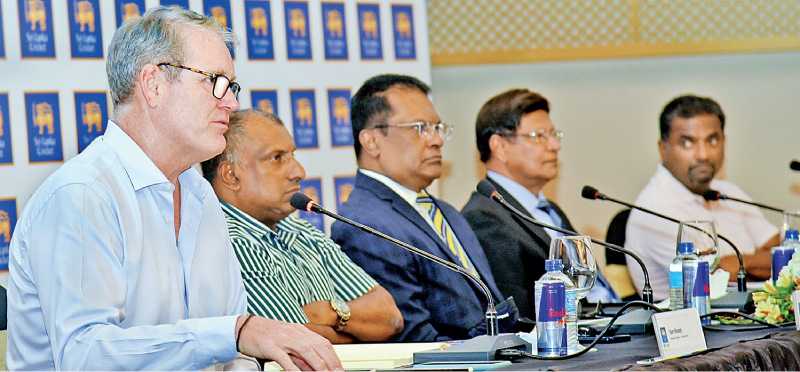Saturday Feb 21, 2026
Saturday Feb 21, 2026
Friday, 26 March 2021 00:02 - - {{hitsCtrl.values.hits}}

From left: Sri Lanka Cricket Director of Cricket Tom Moody, Technical Advisory Committee Chairman Aravinda De Silva, SLC President Shammi Silva, SLC Secretary Mohan de Silva and Technical Advisory Committee member Muttiah Muralitharan at the press conference in Colombo yesterday
By Sa’adi Thawfeeq
Sri Lanka Cricket has more often than not looked overseas for their coaches and support staff, but through their new Director of Cricket Tom Moody, the Sports Ministry-appointed cricket committee headed by Aravinda de Silva hopes to make the country more self-sufficient in these areas in the coming years.
Since Dav Whatmore became coach of the Sri Lanka cricket team and took them to a Cricket World Cup triumph in 1996 there has been a surfeit of overseas recruits to the national team in the form of coaches, physios, trainers etc., draining Sri Lanka Cricket a lot of foreign exchange.
However all that is about to change with the arrival of Moody, who coached Sri Lanka to the 2007 Cricket World Cup final and is glad to be back helping the country’s cricket recover from its current malaise. Moody has been contracted for three years by Sri Lanka Cricket on the recommendation of the Cricket Committee.
“One of Tom’s main responsibilities is to develop and bring coaches, physios and officials to a level so that we need not have to recruit anyone from overseas to serve in these capacities,” said de Silva at a press briefing held at Taj Samudra yesterday.
“After three years (at the end of Moody’s tenure) we must develop in Sri Lanka people to hold these positions as coach, physio etc. We are trying to recruit a person for administrative cricket who will be under Moody to learn from him to carry out this task. There will be education programs for coaches and development programs to increase their knowledge,” he added.
“We appointed Tom Moody because he was a person who had a very good idea of cricket all over the world – the experience as a player, coach and administrator – and on top of that we wanted a strong personality who is going to be independent. Those are the key areas which we considered in deciding on Moody ultimately.
“Tom’s CV gave us a lot of confidence because he has got a variety of experience from all over the world, from the Caribbean PL, as Worcestershire’s director coaching, with Western Australian cricket, Pakistan PL and Indian PL and Sri Lanka, and the experience he had in the administrative field. The other most important fact was that he has worked with the Sri Lankan team for a couple of years and he understands the culture.”
Identifying the areas Moody will be tasked to improve, De Silva stated: “Priority will be the first-class structure, development of cricket and making a pathway for school cricket, current player contracts, support staff and coaching philosophy, club structure, and focus a fair bit on women’s cricket as well.”
Moody however tempered expectations somewhat by stating that the changes would not happen overnight, rather that it needed careful planning.
“A group of people will be involved in the process and I am sure if we stick together through that process we will find ourselves back to where we want Sri Lanka cricket to be, that is on top of the ICC rankings in all formats of the game,” said Moody.
“The three weeks I have been involved I have found that it’s not so much the people, not so much the players, but it’s the infrastructure that we need to review. We need to get the infrastructure right and we need to get the people in the roles, and we have accountability in all of this – including myself.
“My observation from afar on Sri Lanka cricket is that like any other country when a side loses some of the game’s greatest players in a short window it’s very hard to recover from. Australia had a very similar situation and they struggled to recover from the side led by Ricky Ponting many years ago. When you take the heart out of a side – and it happens – it’s hard to recover when you lose players like Murali, Sangakkara, Jayawardene, even if you have planned for the transition, because it is a big gulf to fill. There is always going to be a recovery period and every nation goes through that. It depends on how swiftly you act to get through that period.
“The other thing is once you have a system that provides excellence you allow talent, for which the country is not short of, to thrive. Once you have them in place you will enjoy the rewards of a new first-class structure and the national team will also respond well. There is an enormous gulf between the first-class structure and what’s on offer in the international stage when you have 26 teams competing,” he said.
Pic by Ruwan Walpola